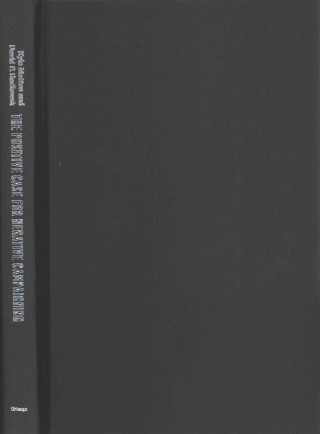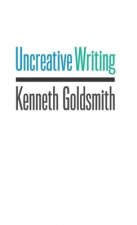
Kód: 04544386
Positive Case for Negative Campaigning
Autor Kyle Mattes, David P. Redlawsk
Turn on the television or sign in to social media during election season and chances are you'll see plenty of negative campaigning. For decades, conventional wisdom has held that Americans hate negativity in political advertising, ... celý popis
- Jazyk:
 Angličtina
Angličtina - Vazba: Pevná
- Počet stran: 256
Nakladatelství: The University of Chicago Press, 2015
- Více informací o knize

2835 Kč
Dostupnost:
50 % šance Máme informaci, že by titul mohl být dostupný. Na základě vaší objednávky se ho pokusíme do 6 týdnů zajistit.
Máme informaci, že by titul mohl být dostupný. Na základě vaší objednávky se ho pokusíme do 6 týdnů zajistit.Prohledáme celý svět
Mohlo by se vám také líbit
-

Willie Lynch Letter and the Making of a Slave
197 Kč -

Nature Guide Rocks and Minerals
403 Kč -

Nada
3188 Kč -

Lawyers and Citizens
6900 Kč -

Iconic Communication
888 Kč -

Dwdm
4964 Kč -

Kids Talking
1767 Kč
Dárkový poukaz: Radost zaručena
- Darujte poukaz v libovolné hodnotě a my se postaráme o zbytek.
- Poukaz se vztahuje na celou naši nabídku.
- Elektronický poukaz vytisknete z e-mailu a můžete ihned darovat.
- Platnost poukazu je 12 měsíců od data vystavení.
Informovat o naskladnění knihy
Zadejte do formuláře e-mailovou adresu a jakmile knihu naskladníme, zašleme vám o tom zprávu. Pohlídáme vše za vás.
Více informací o knize Positive Case for Negative Campaigning
Nákupem získáte 284 bodů
 Anotace knihy
Anotace knihy
Turn on the television or sign in to social media during election season and chances are you'll see plenty of negative campaigning. For decades, conventional wisdom has held that Americans hate negativity in political advertising, and some have even argued that its pervasiveness in recent seasons has helped to drive down voter turnout. Arguing against this commonly held view, Kyle Mattes and David P. Redlawsk show not only that some negativity is accepted by voters as part of the political process, but that negative advertising is necessary to convey valuable information that would not otherwise be revealed. The most comprehensive treatment of negative campaigning to date, The Positive Case for Negative Campaigning uses models, surveys, and experiments to show that much of the seeming dislike of negative campaigning can be explained by the way survey questions have been worded. By failing to distinguish between baseless and credible attacks, surveys fail to capture differences in voters' receptivity. Voters' responses, the authors argue, vary greatly and can be better explained by the content and believability of the ads than by whether the ads are negative. Mattes and Redlawsk go on to establish how voters make use of negative information and why it is necessary. Many voters are politically naive and unlikely to make inferences about candidates' positions or traits, so the ability of candidates to go on the attack and focus explicitly on information that would not otherwise be available is crucial to voter education.
 Parametry knihy
Parametry knihy
Zařazení knihy Knihy v angličtině Society & social sciences Politics & government Political control & freedoms
2835 Kč
- Plný název: Positive Case for Negative Campaigning
- Autor: Kyle Mattes, David P. Redlawsk
- Jazyk:
 Angličtina
Angličtina - Vazba: Pevná
- Počet stran: 256
- EAN: 9780226202020
- ISBN: 022620202X
- ID: 04544386
- Nakladatelství: The University of Chicago Press
- Hmotnost: 486 g
- Rozměry: 160 × 237 × 20 mm
- Datum vydání: 03. March 2015
Oblíbené z jiného soudku
-

The Gulag Archipelago
433 Kč -

On Palestine
361 Kč -

Propaganda
410 Kč -

Gift of Love
276 Kč -

In Order To Live
303 Kč -

Manufacturing Consent
357 Kč -

Understanding Power
472 Kč -

Anatomy of the State
322 Kč -

Long Walk To Freedom
433 Kč -

Half the Sky
375 Kč -

On Liberty
276 Kč -

Red Horizons
431 Kč -

How Propaganda Works
524 Kč -

Creating Capabilities
554 Kč -

I Have a Dream
394 Kč -

Fear No Evil
472 Kč -

In Harm's Way
1704 Kč -

Handbook of Tyranny
848 Kč -

Zinnophobia
1003 Kč -

Nothing To Envy
268 Kč -

The Gulag Archipelago, 1918-1956
443 Kč -

The Gulag Archipelago, 1918-1956
466 Kč -

Human Rights: A Very Short Introduction
250 Kč -

Inventing Human Rights
419 Kč -

New Jim Crow
302 Kč -

Political Philosophy: A Very Short Introduction
268 Kč -

Cultural Cold War
499 Kč -

Commissar Vanishes
716 Kč -

Rights of Man
196 Kč -

Anatomy of the State
198 Kč -

Constructing Cassandra
1040 Kč -

Gulag Archipelago
464 Kč -

International Law: A Very Short Introduction
268 Kč -

Anarcho-Fascism
462 Kč -

The Net Delusion
303 Kč -

Orwell on Truth
308 Kč -

Uncreative Writing
546 Kč -

Soul of America
617 Kč -

Parkland: Birth of a Movement
464 Kč -

Satow's Diplomatic Practice
2692 Kč -

Universal Human Rights in Theory and Practice
924 Kč -

Legitimacy of International Human Rights Regimes
1088 Kč -

Art of Revolt
528 Kč -

Domination and the Arts of Resistance
604 Kč -

Desert and the Sea
302 Kč -

Witness for the Defense
569 Kč -

Sociology of Human Rights
810 Kč -

Terrorism, Rights and the Rule of Law
1575 Kč -

Suffragettes
90 Kč
Osobní odběr Praha, Brno a 12903 dalších
Copyright ©2008-24 nejlevnejsi-knihy.cz Všechna práva vyhrazenaSoukromíCookies


 Vrácení do měsíce
Vrácení do měsíce 571 999 099 (8-15.30h)
571 999 099 (8-15.30h)